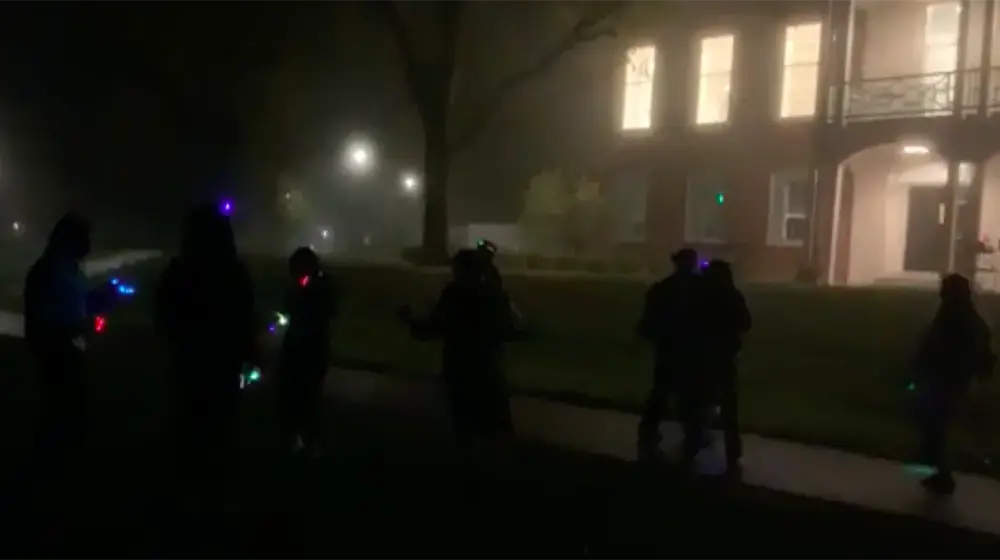Fall Term at Bennington
As Bennington begins the second half of the Fall 2020 term, we reflect on the ways our community has adapted to learning and living on campus and beyond this fall—and the experiences, successes, and moments of joy along the way.
Bennington’s approach to welcoming students back to campus amid the challenges posed by COVID-19 has centered on a safety plan that put trust and connectedness among all students, faculty, staff, and community members at the forefront.
Currently, there are no active cases of COVID-19 on campus.
Learn more about how Bennington prepared for a safe reopening, and keep up with the latest COVID-19 updates on the College’s website.
Innovative Learning
This fall, instead of following Bennington's usual 14-week term structure, Fall 2020 was divided up into two 7-week terms—a design that made it easier for students and faculty to respond to sudden increases in remote learning, either for individuals who needed to quarantine or in the event of outbreaks on campus.
Fortunately, due to the Bennington community's ongoing commitment to COVID-19 safety, this term flexibility hasn't been necessary. For Spring 2021, Bennington will resume its full 14-week term structure.
Along with these structural changes to Fall term, Bennington's faculty have approached their courses with flexibility and innovation—teaching in-person, remotely, or with a blended model to accommodate students both on- and off-campus.
Tailgate Office Hours
This term, faculty member Vanessa Lyon encouraged social distancing, caught up with her students, and enjoyed Vermont's fall weather through her weekly tailgate office hours.
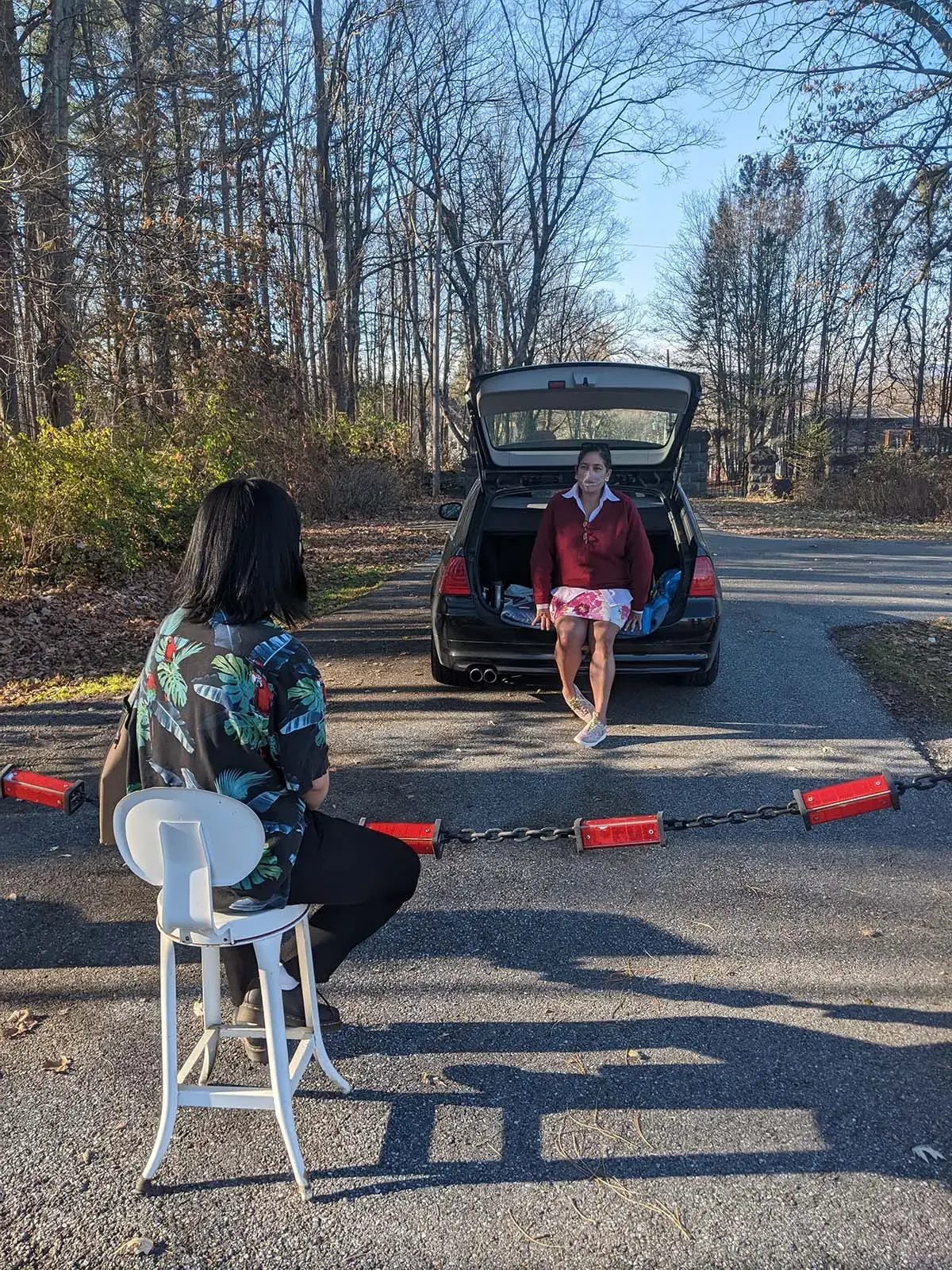
Socially Distant Ear Training
Visiting faculty member Joseph Alpar shared his set up for a socially distant Intermediate Ear Training course, which took place outside of Jennings Music Building.
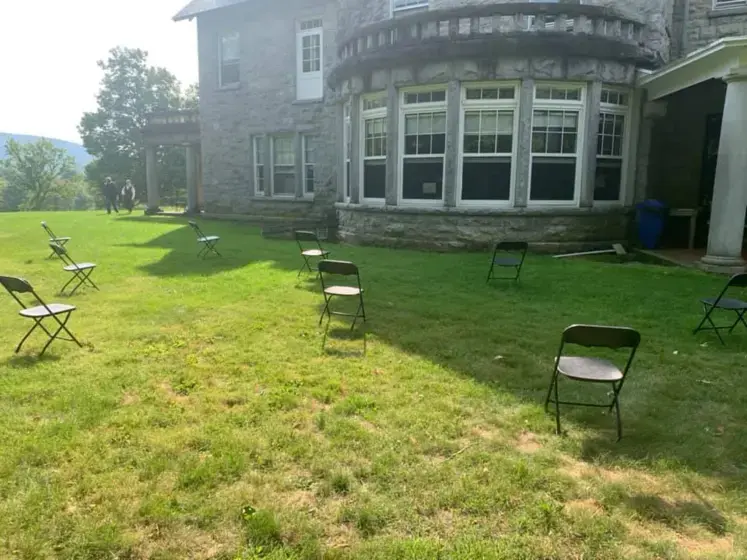
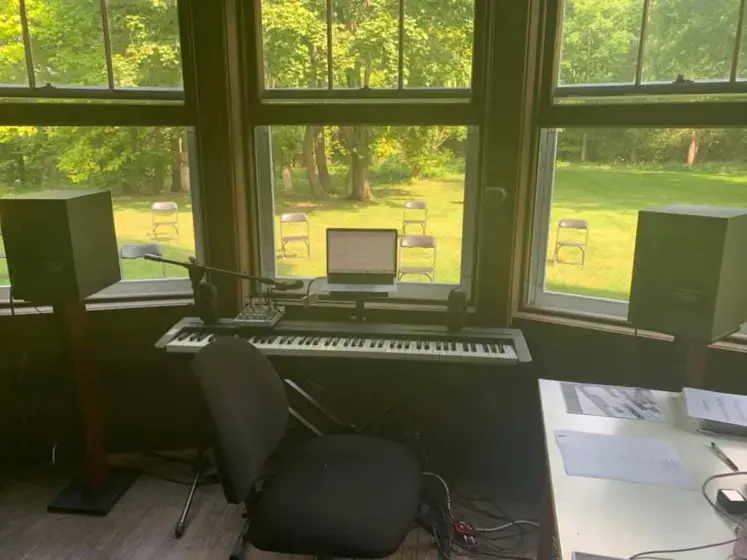
Alpar wishes to thank Technical Instructor in Sound & Music Curt Wells, who installed an electric piano, speakers, and other sound technology so Alpar can seamlessly teach students both in person and via Zoom, as well as Buildings and Grounds, who built and installed new wooden screens so Alpar could fully utilize all seven of the room’s enormous windows.
Going Beyond Plastic Pollution
This fall, Bennington College launched Bennington+, a suite of offerings for learners at every stage of their academic lives—from high school seniors to retired professionals. Bennington+ includes Bennington Unbound, a series of writing courses from Bennington's acclaimed literature program; CAPA Online an exciting selection of social justice and public action courses; and the opportunity for anyone to take classes from Bennington core curricular offerings.
Through CAPA Online, Beyond Plastics President Judith Enck offered Beyond Plastic Pollution, which engaged 85 students from Bennington and around the world in an environmental policy course that focused on the systemic reasons on why over 9 million metric tons of plastics enter the ocean each year.
Beyond Plastic Pollution focused on how plastic pollution is a climate change issue, how the plastics industry spins the myth that we can recycle our way out of the problem, environmental justice, the health impacts of plastic production and use, alternatives to plastic, and—most importantly—what people can do to address this growing problem.
Connecting Through Mail Art
Since the start of social distancing, students working with Anne Thompson, Visual Arts faculty member and Usdan Gallery Director and Curator, have been making mail art, a time-honored practice in which artists use the postal service to subvert institutional structures and restrictive conditions.
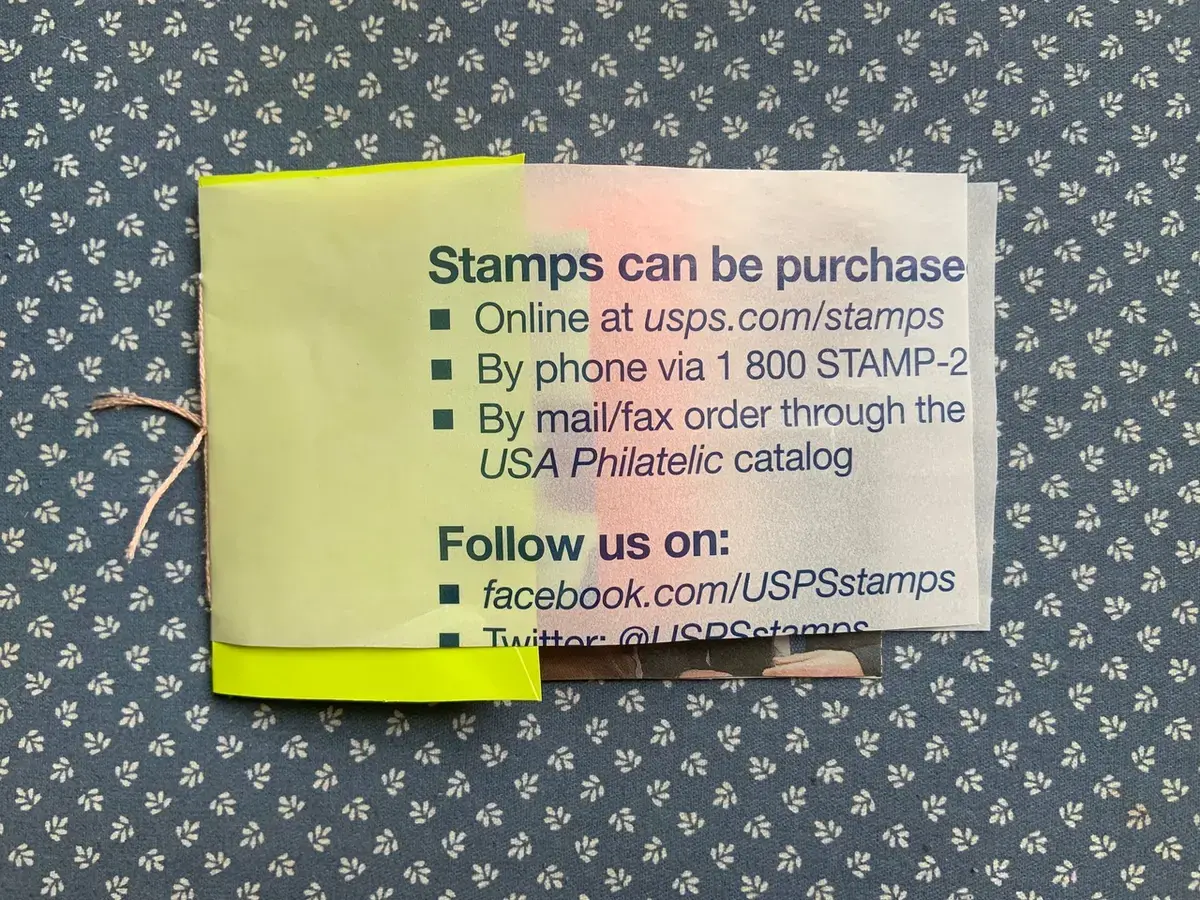
During Spring 2020, sequestered students sent mail art to each other all over the country as part of the course Delights of Ephemera.
This term, for Fall 2020, the work of the Mail Art course has taken on heightened meaning amid the crisis surrounding the USPS and mail-in voting, with readings and discussions focused on the history of the mail as a vehicle for political expression.
COVID-era student mail art projects are being archived in Crossett Library and can be found online.
Belarus and Democracies Around the World
Responding to student interest, Director of CAPA Susan Sgorbati organized Belarus: A Critical Understanding of Democracy. This pop-up course, supported by the Center for the Advancement of Public Action (CAPA), was offered in coordination with Bennington's Belarusian students.
The course provided a critical understanding of democracy by examining what is happening in Belarus, with the space for students to respond creatively. Students explored different historical and current perspectives, media coverage (and what is not covered), personal accounts, and conversations with activists; additionally, students drew on writings by scholars, artists and journalists whose work focuses on Belarus.
Form to Function
In the hybrid art and design course Form to Function: The Chair, students conceived, designed, modeled, and executed their own original chair designs.
This course was led by faculty members Jon Isherwood and John Umphlett MFA '99, with Technical Instructor in 3D Fabrication and Digital Art Dakota Pace providing 3D modeling and CNC processing.
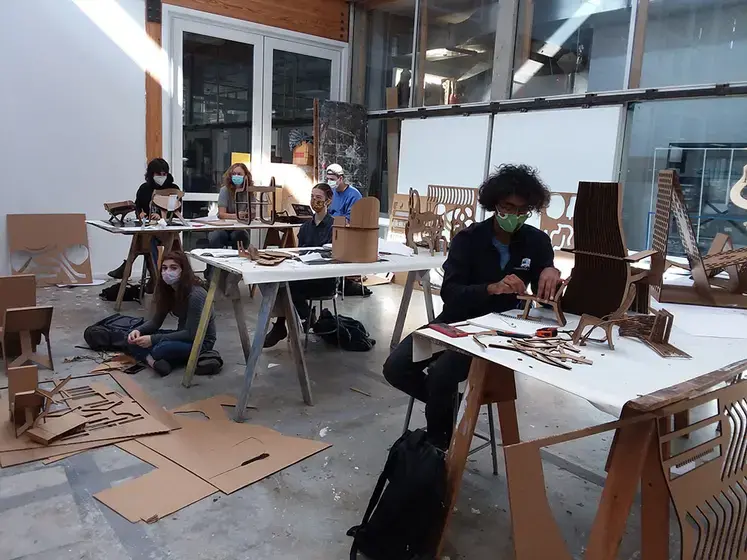
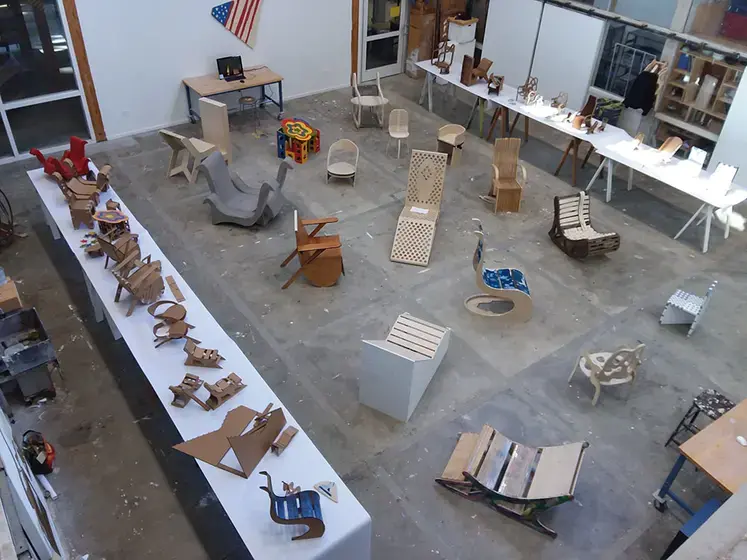
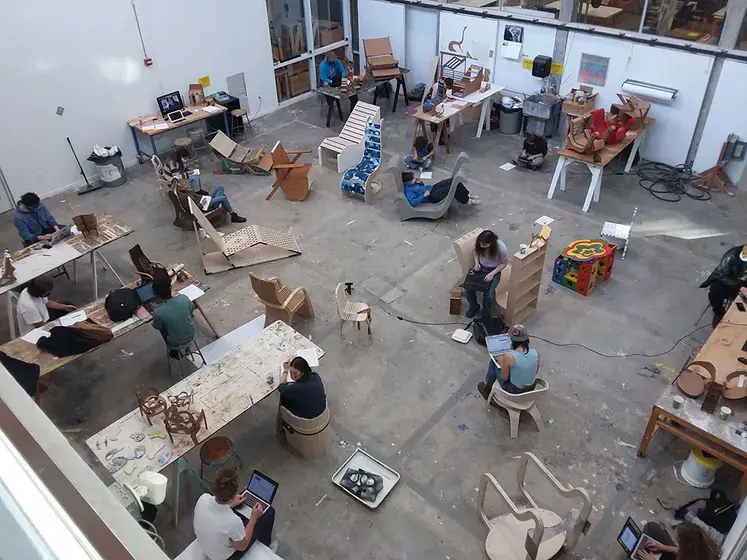
For their final class, the group of students displayed their 18 completed chairs, which had undergone extensive design processes—from research, to hand-drawn sketches, to cardboard hand-cut models to laser-cut half-scale models and finally to CNC wood structures.
Living in Letters
In faculty member Mark Wunderlich's course Letters to a Young Poet: Rainer Maria Rilke, students bridged the distance, formed connections, and dove deep into poetry through an ongoing exchange of letters.
On his blog and in Popula, Wunderlich discussed the personal connection and educational focus that arose from conducting this course through mailed letters.
"As I thought about Rilke’s work, I thought too about the letters he wrote—thousands of them over a lifetime—and I began to conceive of a class that was entirely an exchange of letters," wrote Wunderlich. "These letters would be unique, made only for this class. I wanted my students to have something to look forward to, to have something good come to them in the mail, and to give them the chance to read a letter, consider it, before responding thoughtfully and with care."
Exploring Local Landscapes
In faculty member Kerry Woods's course Local Landscape B: Field Ecology and Natural History, students embraced the opportunity to study their natural surroundings on Bennington College's campus and the surrounding region.
As a companion to the classroom-based section A, which could be taken remotely, Local Landscape B helped students deepen and reinforce their understanding of ecological principles through experience and systematic observation in the field. Students developed their observational and intellectual tools, all of which are critical to becoming a serious "field naturalist."
The course also gave students the opportunity to gain a hands-on familiarity with the ecosytems, natural history, and biota of Bennington's biologically rich and diverse region.
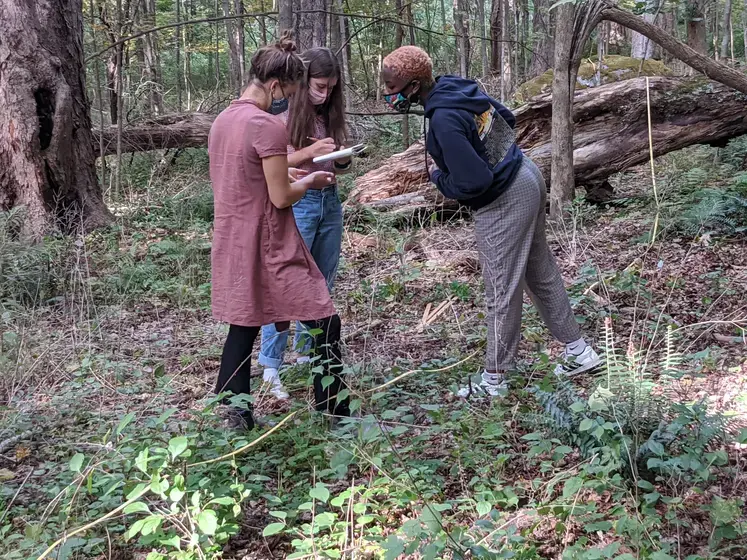
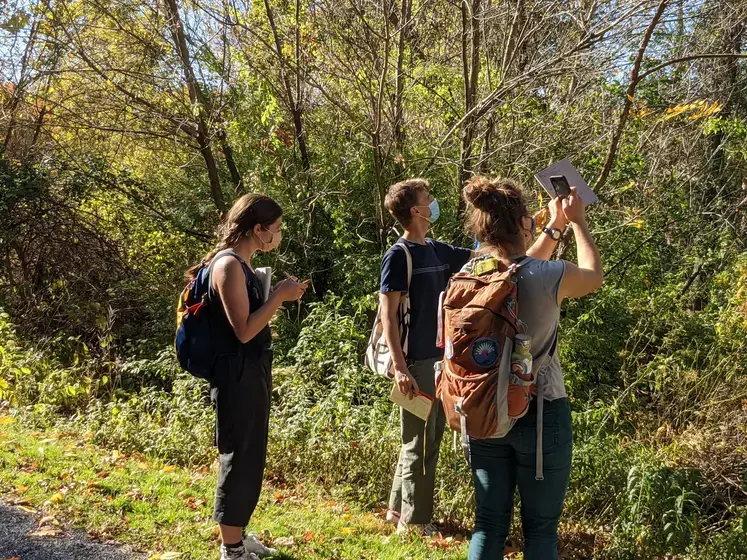
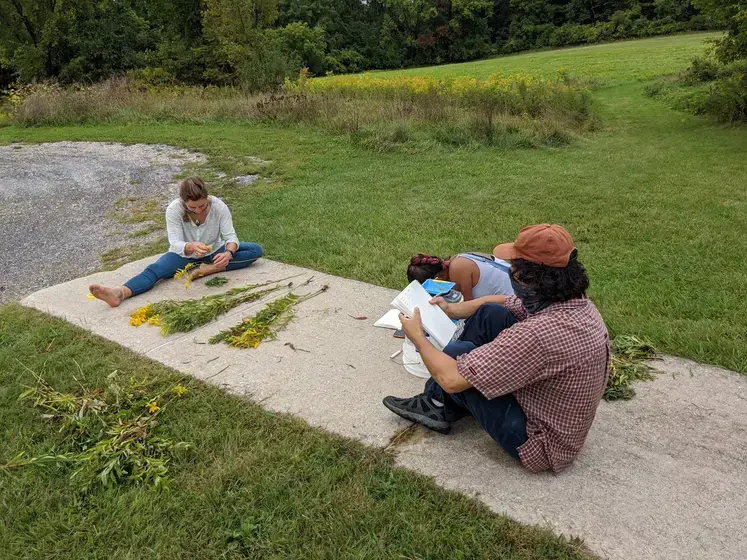
Art and Writing from Multicultural, Multilingual Lives
Expanding on faculty member Marguerite Feitlowitz's Fall 2019 course Living in Translation: A Student-Run Literary and Cultural Publication, during Fall 2020, Bennington students launched (M)othertongues Magazine.
"We are living in a multicultural, multilingual era, creating new spaces for hybridity that unsettle cultural binaries of the past," writes the (M)othertongues editorial team. "We believe it is important to complicate the dichotomous idea of here and there-ness that has dominated historical narratives. We aim to create a publication that looks to address themes such as migration, diaspora, in-betweenness, identity, cultural diversity, and language."
(M)othertongues Magazine is supported by the Andrew W. Mellon Foundation, in collaboration with the Consortium on Forced Migration Displacement and Education, which encompasses the colleges of Bennington, Sarah Lawrence, Bard, and Vassar.
Career Prep Amid a Global Pandemic
During COVID-19, Bennington’s Office of Career Development and Field Work Term has worked alongside students to support their internship and career goals by offering increased flexibility, expanded work options, and staff support, even amid a global pandemic and economic recession.
Read more about how Kayly Hernandez Panameno ’22, Andrea Tovar ’23, and Imara Glymph ’23 made valuable discoveries in Public Action, Computer Science, Environmental Studies, and Writing during their remote summer internships.
Cultivating Community
Gleaning Apples, Donating Produce
Throughout this summer and fall, the Bennington College community has come together to donate produce from local gardens and glean apples from trees on the College’s property in order to benefit Bennington food pantries. This Grow A Row program was developed by visiting faculty member Tatiana Abatemarco and Director of CAPA Susan Sgorbati, and implemented by Robert Frost Stone House Museum Director Erin McKenny.
“I have been overwhelmed by the generosity of our community through our Grow A Row and apple gleaning program,” said McKenny. “About 12-15 gardeners have taken part in our Grow A Row program, and we have been able to deliver about 30 different kinds of vegetables and herbs to two local food pantries throughout the summer and into the fall. We have also had a wonderful response to our apple gleaning program—both from folks ready to pick and others who dropped off already picked apples at the Robert Frost Stone House Museum. Through these efforts, we have donated about 800 pounds of apples so far."
These hunger-fighting initiatives are part of the College’s ongoing Andrew W. Mellon Foundation-funded work to address food insecurity in Bennington County.
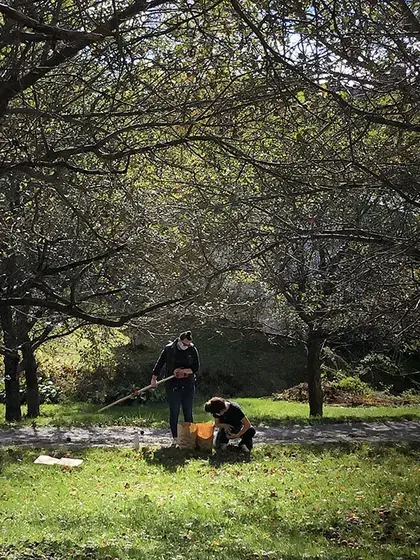
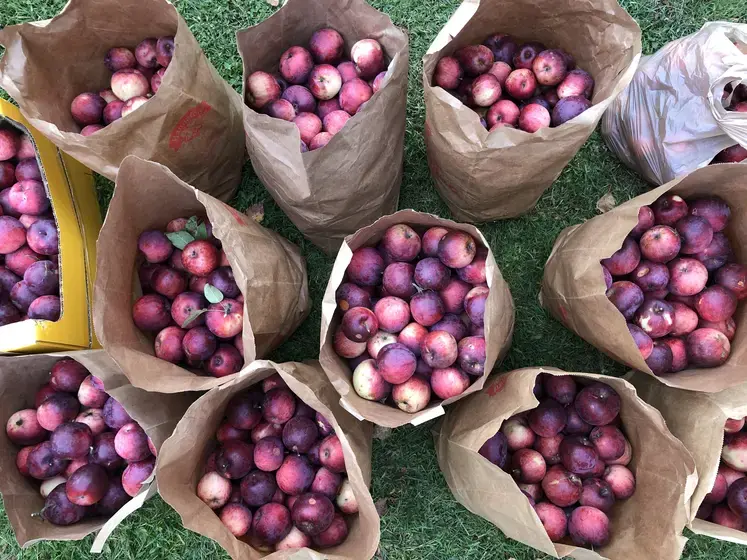
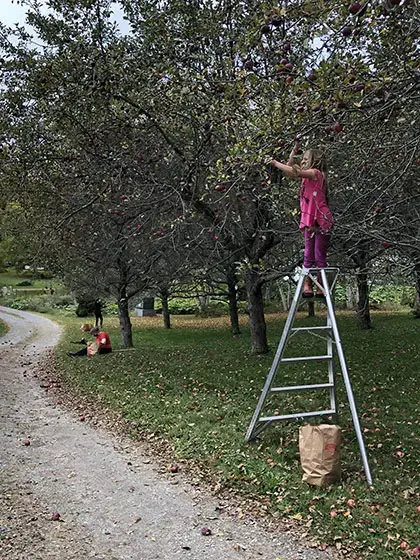
Activities For Students, By Students
Students who chose to return to campus this fall have been deliberate about creating community in healthy, socially distanced ways.
From weekly Coffee Hours convened outside—giving students a chance to catch up and hear about the week ahead while maintaining social distance—to outdoor movie nights, students have created lasting connections and friendships with their fellow housemates. Sawtell House Chair Cass Skarka '22 shared photos of these events.
Students' commitment to social justice has also remained strong. In September, the Black Student Union organized an outdoor rally on Commons Lawn, socially distanced and with masks, to support Black Lives Matter. Delia Saenz, Vice President for Institutional Inclusion, Equity, and Leadership Development; Ara Aman '21; and Rojay Bryan '22 shared photos of the event.
Visit Bennington College's Instagram to see more student perspectives on life on campus this fall.
On October 2, the Programs and Activities Council (PAC) and B-Rad hosted a Silent Disco on Commons lawn, which brought 70+ students together for a socially distanced outdoor dance party. B-Rad created a playlist for the occasion, and PAC provided promotion and supplies, as well as portable MP3 players and headphones for anyone who might not have their own.
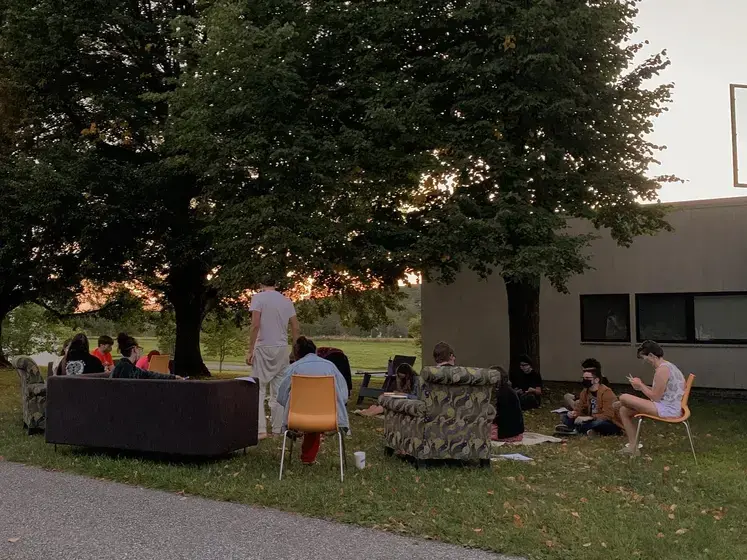
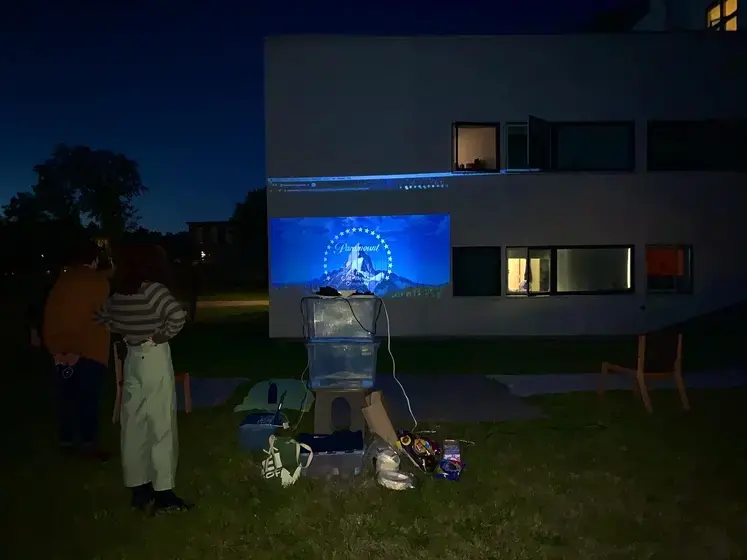
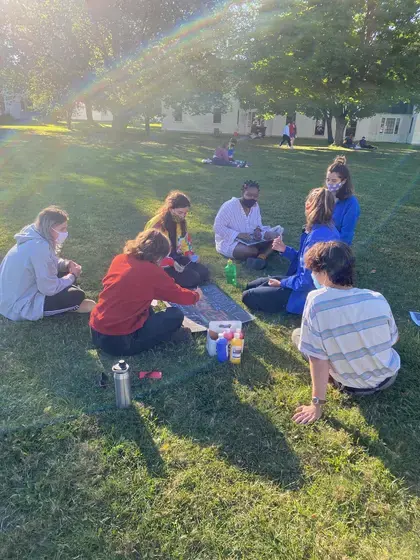
Silent Disco
On October 2, the Programs and Activities Council (PAC) and B-Rad hosted a Silent Disco on Commons lawn, which brought 70+ students together for a socially distanced outdoor dance party. B-Rad created a playlist for the occasion, and PAC provided promotion and supplies, as well as portable MP3 players and headphones for anyone who might not have their own.
Fall Weekend
From October 16-19, Fall Weekend—traditionally an opportunity to welcome family and friends to campus—was instead reimagined as an opportunity to rest, recharge, and reflect on the community's accomplishments this term.
The weekend featured a line up of events that could be enjoyed both on campus and remotely—from a Farm-to-Table Harvest Dinner to a Zoom Trivia Night, an ongoing photo scavenger hunt to dodgeball on Commons Lawn, a live virtual performance from singer/songwriter Caroline Rose to a work day at the student-run Purple Carrot Farm.
Photos from Fall Weekend 2020 can be browsed on Bennington College's Flickr.
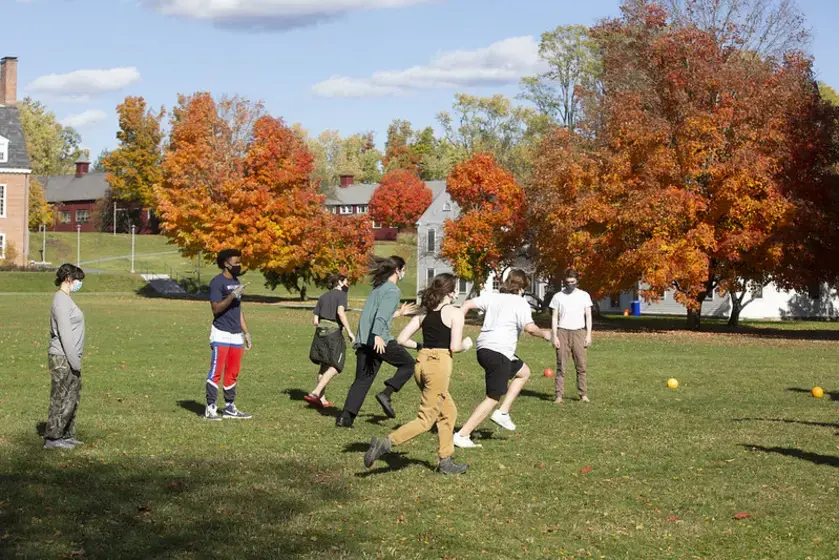
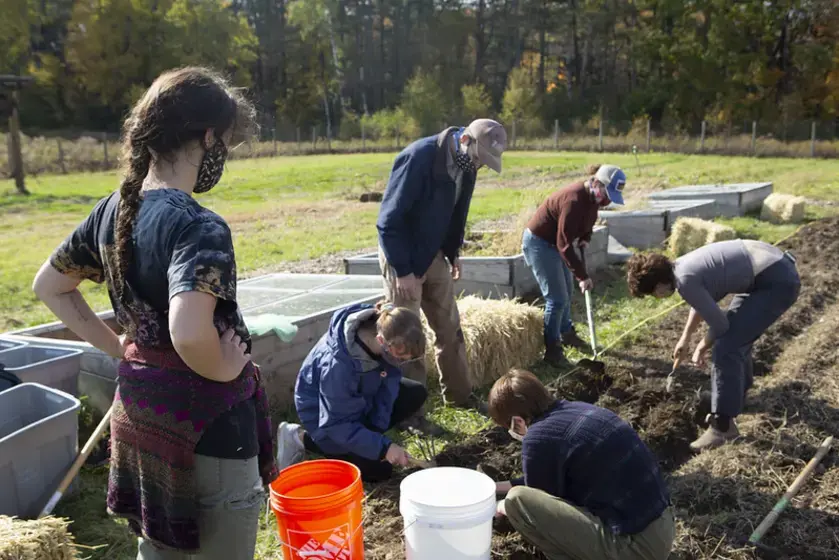
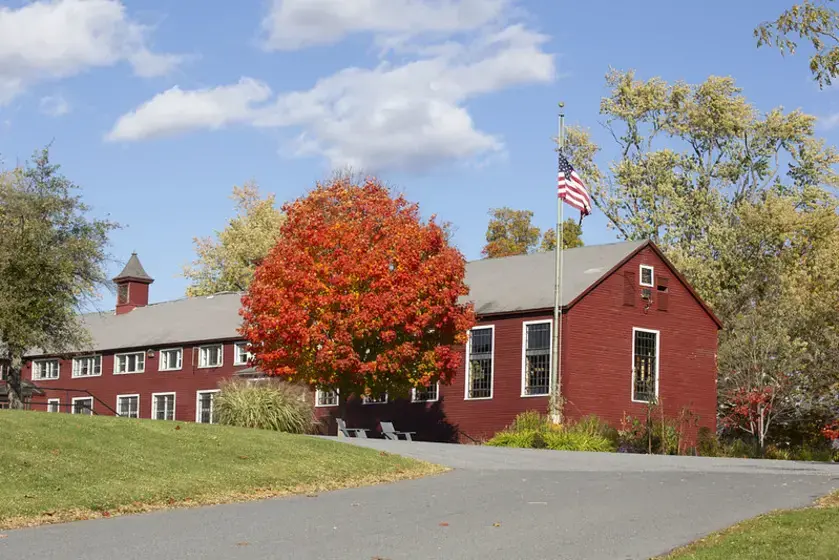
Preparing for the 2020 Election
In anticipation of the 2020 Presidential Election, Bennington College's Center for the Advancement of Public Action (CAPA) offered numerous courses and activities aimed at educating students, faculty, staff, and community members about their democratic rights and responsibilities.
Faculty members David Bond and Judith Enck co-taught Running for President in 2020, a course that was also made available to lifelong learners from anywhere in the world through the remotely offered CAPA Online: Building Community program.
This course used the 2020 campaigns for the US Presidency as a springboard to become more informed and more involved in the elected direction of American democracy. Tracking between journalistic coverage and policy platforms, between glossy books by candidates and scholarly points of historical comparisons, between the aspirational rhetoric of campaigns and the worsening condition of most residents in the nation, between the realities of a global pandemic and the stark social needs it brings into focus, this course dove deeply into the political currents of this moment.
In September, Rock the Vote hosted a Zoom training for the Bennington community, which was aimed at educating voters—particularly college students voting for the first time—about important dates, deadlines, ID requirements, early vote and absentee ballot options, what and who are on their ballot, polling locations, COVID-19 election-related changes, and more.
In October, David E. Sanger, New York Times national security correspondent, joined Bennington College President Laura Walker and WAMC Radio's Joe Donahue for a discussion on The Perfect Weapon, an HBO documentary special based on Sanger's best-selling book.
“We were so pleased to welcome David Sanger to discuss his extraordinary reporting on this emerging threat, rivetingly explored through The Perfect Weapon,” said President Laura Walker. “This event was timely, as much of what Bennington students pursue today intersects with geopolitics, the state of democracies around the world, and the role of technology in our lives.”
Trust and Connectedness
As colleges and universities around the country reopen this fall amid the COVID-19 pandemic, students, faculty, and staff have had to reimagine all aspects of higher education—from academics and classes to residential and social life—to comply with public health mandates that slow the spread of the virus.
Bennington's approach to a safe reopening has incorporated early action and frequent collaboration, creative approaches to challenges, and expecting the best from our students. Read more about Bennington's reopening strategies and values.
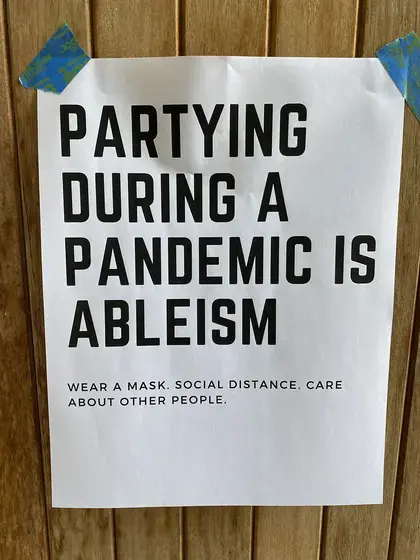
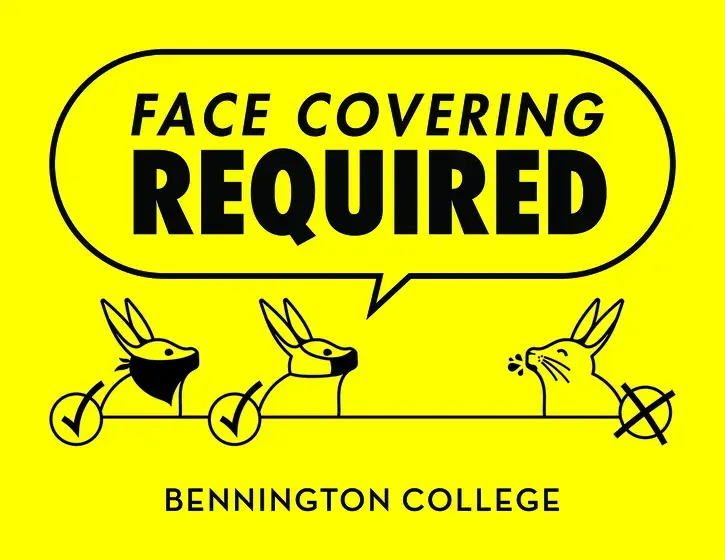
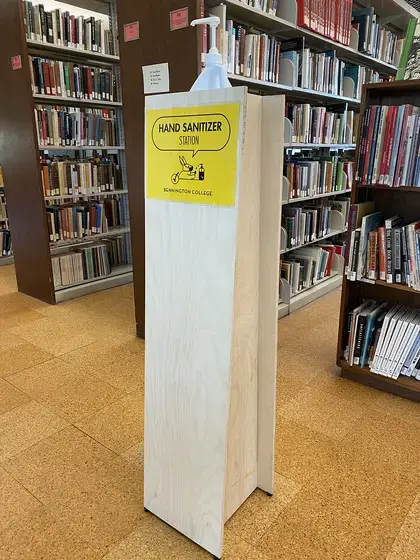
Connecting from Afar
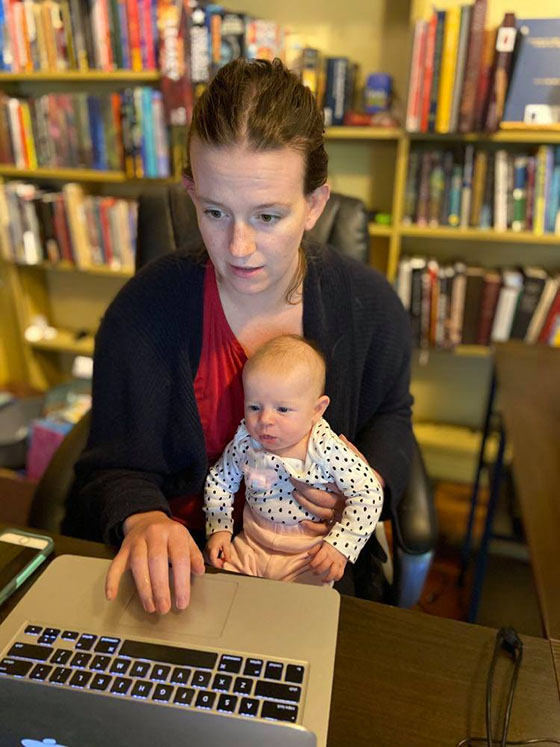 This fall, to keep the on-campus population low—and to safeguard the health of returning students, faculty teaching on-campus, and essential staff—31% of staff and faculty members who were able to opted to continue working fully remotely.
This fall, to keep the on-campus population low—and to safeguard the health of returning students, faculty teaching on-campus, and essential staff—31% of staff and faculty members who were able to opted to continue working fully remotely.
For Alumni Relations Coordinator Katie Braymer-Hayes, the time spent at home has also come with added time to bond with her newest coworker, Cora.
Hosting Remote Events
Due to restrictions on large gatherings, public events were not held on campus this fall. However, many popular event series continued in a virtual format—allowing invited speakers to draw online crowds from Bennington and beyond.
Presenting on Gender, Agriculture, and Food Access
Visiting faculty member Tatiana Abatemarco and students from her course Gender, Subsistence, and Agriculture have been invited to present as part of a virtual Agricultural Literacy Week celebration, hosted by the Northeast Farming Association of Vermont (NOFA-VT).
On November 19 from 6:00-7:30 pm, Bennington students will share the results of their oral history project, which interviewed farmers, gardeners, consumers, and advocates who work in a variety of local food access programs. Students' research focuses on the intersections between food access projects and gender identity, and the results will be presented in conversation with local expert Ike Leslie, who has researched and published on the topic of gender and agriculture.
Music Mondays from the Carriage Barn
As Bennington's first-ever remote concert and music lecture series, Music Mondays from the Carriage Barn features influential and boundary-pushing guest performers and scholars. With an ambitious and adventurous line-up, the heart of Music Mondays from the Carriage Barn is performances and research that highlight music and lives of Black, indigenous, people of color, queer, female-identified, and non-binary performers and artists.
Upcoming events in October and November 2020 include Rashida K. Braggs, who will explore how embodied performance can be an innovative and insight-prompting research tool that contributes to multiple jazz methodologies; the Bennington Music Festival, an eclectic program of student compositions and performances across the spectrum; Alexandro D. Hernández, PhD, who will explore the son jarocho as music of struggle and protest from Mexico to the US; and faculty member Brian Michael Murphy, who will give a talk outlining a digital archiving project aimed at preserving hip hop culture.
All Music Mondays events will be streamed on Monday evenings, 7:00-8:00 PM.
Visual Arts Lecture Series
Each term, Bennington offers the Visual Arts Lecture Series, organized by faculty member Vanessa Lyon—a program of lectures by visiting arts professionals: artists, curators, historians and critics, selected to showcase the diversity of contemporary art practices.
This term's series will center on Race, Representation, and Contemporary Art in the Age of Black Lives Matter. VALS will begin on November 10 with a presentation by Key Jo Lee, an art historian, curator, critic, and the Assistant Director of Academic Affairs at the Cleveland Museum of Art.
Throughout November and December 2020, VALS presenters will include Kahlil Robert Irving, a San Diego-born sculptor and ceramist; Maria Gaspar, an interdisciplinary artist whose work addresses issues of spatial justice in order to amplify, mobilize, or divert structures of power through individual and collective gestures; and Kota Ezawa, whose work explores the appropriation and mediation of current events and images, referencing sources from the news, art history, and popular culture.
All VALS events will be held over Zoom on Tuesday evenings, 7:00-8:00 PM.
Webinars for Public Action
This fall, as part of Bennington's $1 million grant from the Andrew W. Mellon Foundation that supports a three-year collaborative effort with local partners to address the systemic causes of food insecurity in Bennington County, the Center for the Advancement of Public Action and the Robert Frost Stone House Museum offered a three-part webinar series on food preservation to members of the community.
The webinars included Food Preservation, featuring a panel of local experts who shared how they are preserving food this season and answered questions about food preservation and gardening; Fall Preparations for Winter Gardens, wherein experts shared how they preserving their fall gardens for winter; and Storage Crops, which included a panel of experts who shared how to store vegetables through the winter.
All webinars are now available to stream online.
Poetry at Bennington
Begun in 2012, Poetry at Bennington is a series of brief multi-day residencies by prominent contemporary poets, both established and emerging, that is hosted by Bennington College.
This fall, in line with public health practices, all readings were presented remotely over Zoom. Speakers ranged from Joy Harjo, the current US Poet Laureate, to three terrific poets on the Columbia University faculty—Timothy Donnelly, Dorothea Lasky, and Shane McCrae—to Layli Long Soldier, a member of the Oglala Sioux nation who won the National Book Critics Circle Award for her first book of poems, to Kiki Petrosino, a University of Virginia professor and recent NEA fellow whose fourth formally daring collection of poems rigorously explores American racial history and reality.
Director of Poetry at Bennington Michael Dumanis and Luciana Arbus-Scandiffio '20 spoke to BTWBerkshires about this fall's virtual lineup.
“There’s a different kind of community that’s being created,” said Dumanis. “As we all log into our little boxes, there’s a sense of all of these people taking a pause in their day to listen to poetry together across space, across geographic space and making space and making time for this.”
Science Workshop
Bennington's Science Workshop is a weekly series of presentations for students working in math and the sciences, as well as for the broader College community.
Throughout the term, the series hosts outside speakers, as well as Bennington faculty and students, as they describe their research and its broader applications. This term, all Science Workshops will take place on Zoom.
In Fall 2020, Science Workshop events included faculty member Kerry Woods, who discussed his recent research in old growth forests, and "Singin' in the Brain," a presentation by Elizabeth Leininger, PhD of New College of Florida, who spoke about Neural mechanisms underlying the evolution of vocal behaviors.
